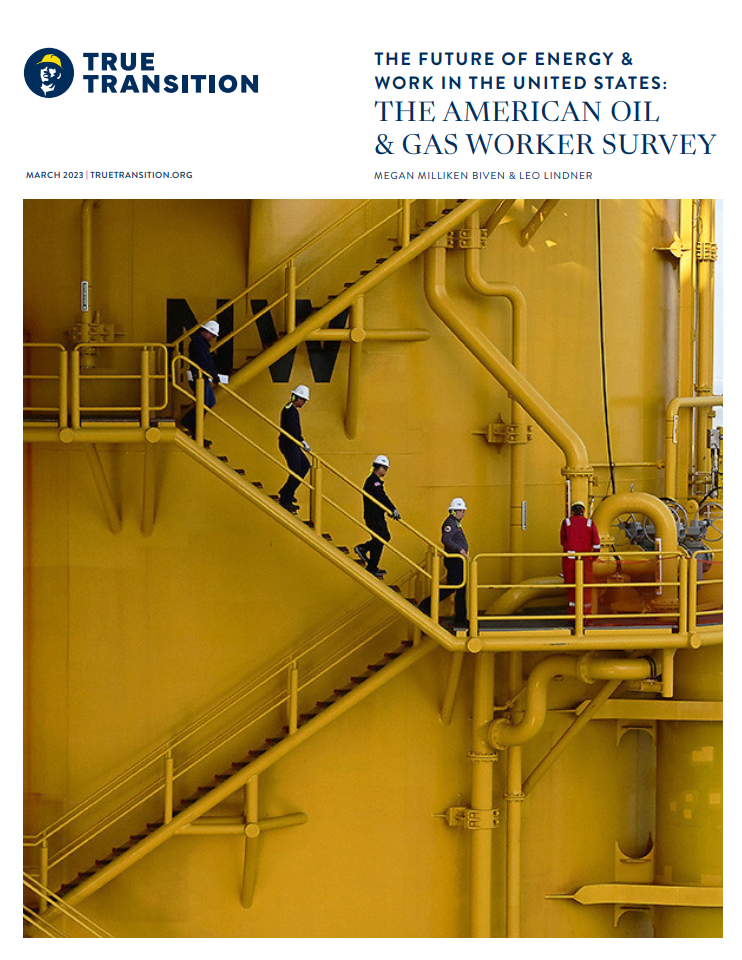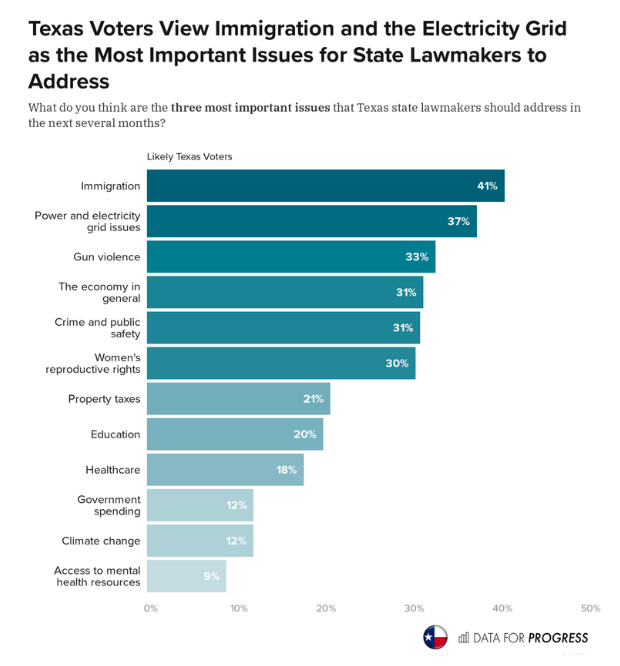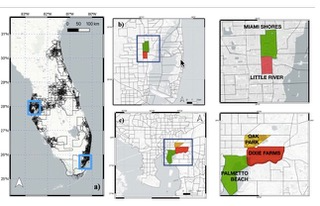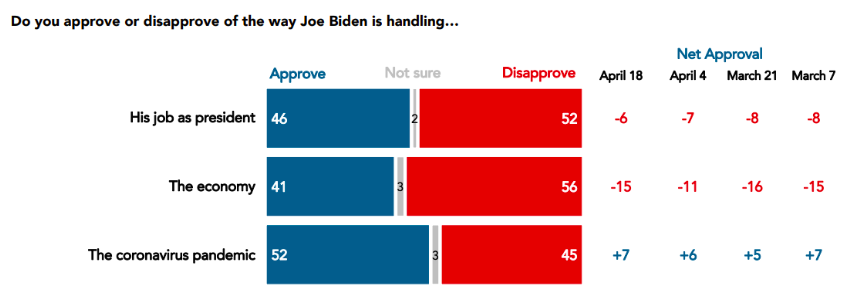Resources
Search below for resources covering the intersection of climate engagement, social science and data analytics.
RESULTS
The Future of Energy & Work in the United States: The American Oil & Gas Worker Survey
Cross sectional survey of 1,635 non-management oil and gas workers in the US revealed new insights and key themes relevant to a truly "just transition" from fossil fuels, including:
Climate Opportunity Map
This resource displays maps showing where renewable construction jobs, renewable operations jobs, energy efficiency jobs, reduced travel delays, electricity savings, lives saved by cleaner air, and labor hours saved are across the United States. Users can look up this data by zip code.
Poll: Texas Voters, Feeling the Pinch of High Home Energy Prices, Support Investments to Improve the Grid
Texas voters continue to say that the state government isn’t doing enough to protect Texas from climate change, but are confused about who to blame for the state’s energy problems. Texans who are experiencing higher home energy prices are about equally likely to say that President Biden (54%) and the Electric Reliability Council of Texas (56%), or ERCOT, deserve a “great deal” of blame for their higher energy bills. When they are informed that the Texas electricity grid is independent and therefore not subject to regulation by the federal government, however, Texas voters are 26 points more likely to say that ERCOT deserves a “great deal” of blame (65%) than President Biden (39%).
Measuring, mapping, and anticipating climate gentrification in Florida: Miami and Tampa case studies
Recognize the disruptive potential of climate gentrification. This study looks at the current and potential impact of climate gentrification on low- and middle-income renters in Miami and Tampa, as areas away from the immediate coast become more desirable due to a growing awareness of climate risks. The authors have created a Climate Gentrification Risk Index to help local officials identify areas vulnerable to climate gentrification and plan for long-term land use changes.
Volts podcast: Fran Moore on how to represent social change in climate models
New research is incorporating social and political processes into climate science models. These models usually do not account for political “feedback loops” and only try to predict climate futures based on emissions trajectories and the impacts of policies on them. This interview with a researcher includes a discussion on other forces that are likely to affect climate futures, such as how policies that are (or are not) passed will change public opinion and other forms of political power that will in turn affect policy and have other effects on degrees of global warming. This research is brand new and is trying to make more accurate predictions about how climate policy might affect future climate scenarios.
Poll: Public split between clean energy, oil drilling in response to high gas prices
Climate advocates should continue making the case that doubling down on fossil fuels is not the answer to today’s energy crisis. In response to high energy prices, Americans want to speed up the clean energy transition and increase oil and gas drilling. 52% agree that “The United States should make it easier to drill for oil and gas offshore and on land owned by the federal government, and approve more oil and gas pipelines” (and 25% disagree). 435 agree that “The United States should invest in speeding up the transition from fossil fuels to electric vehicles and clean sources of energy” (and 34% disagree). When asked to choose between increasing fossil fuel extraction or speeding up the transition to cleaner energy sources, Yahoo and YouGov find that Americans are split: 31% prefer making it easier to drill for oil and gas on federal government land and approving more pipelines, 29% prefer speeding up the transition from fossil fuels to electric vehicles and clean sources of energy, and 20% prefer doing both. The public is divided on what impact additional drilling on public land will have in lowering gas prices “in the near future,” with 34% expecting additional drilling will lower gas prices in the near future, 36% expecting that additional drilling won’t lower gas prices in the near future, and 30% not sure enough to say.
Support for Biden’s economic plan, with a description including investments in climate and clean energy, hit a new high. Support for the clean energy-heavy economic plan from Biden and Democrats has reached its highest point in Navigator’s tracking, with 71% now in favor and just 20% opposed. This includes nearly unanimous support from Democrats (91% support / 3% oppose), overwhelming support from independents (70% support / 15% oppose), and even a 10-point margin among Republicans (49% support / 39% oppose). Like other pollsters, Navigator finds that Biden’s job approval is sagging and he scores particularly poorly for his economic performance: the poll finds that voters disapprove of Biden’s handling of the economy by a 56%-41% margin.
Poll: Voters Say Higher Energy Prices Show Need to Increase Renewable Energy
Voters overwhelmingly agree that it is “more important than ever for the United States to become less dependent on fossil fuels” after Russia’s invasion of Ukraine. High support for increasing fossil fuel production in the short term shows that voters are feeling cross-pressured on the issue amid the current energy crisis. 75% agree with the statement that “the primary goal of U.S. energy policy should be achieving 100% clean energy.” 71% agree with the statement that “it is more important than ever for the United States to become less dependent on fossil fuels such as oil and gas because of the spike in gasoline and natural gas prices that have been caused by Russia’s war against Ukraine.” Majorities agree that increasing production of renewables would be better than increasing production of fossil fuels for energy independence (59%-35%), national security (55%-35%), and job creation (53%-36%). At the same time, however, voters are clearly feeling squeezed by high gas prices (54% are “very worried” about the price of gasoline) and the public is accordingly willing to accept several proposed remedies aimed at alleviating the energy crisis - including increasing the domestic production of fossil fuels. When they are proposed as policies to respond to the spike in gasoline and natural gas prices, majorities support both increasing the production of renewable energy in the United States (72% support / 18% oppose) and increasing the production of oil and gas in the United States (70% support / 18% oppose).
Environmental Polling Roundup - January 28th, 2022
This post includes climate and environment headlines, data points, and key takeaways from recent public polls - including new polling on the Build Back Better plan, the economic risks of climate change, corporate accountability measures, environmental justice, and voters’ relative trust in the two parties to handle climate change.
More than three in five voters support the Build Back Better Plan, and support among Republican voters has increased over the past month. Most voters also believe that the plan’s major provisions will be effective in lowering household costs. 70% of voters believe that the Build Back Better Plan’s major provisions (including letting Medicare negotiate lower prescription drug prices, reducing the costs of child care, and lowering utility bills) will be effective in bringing down the costs facing American families.
Pagination
- Page 1
- Next page







